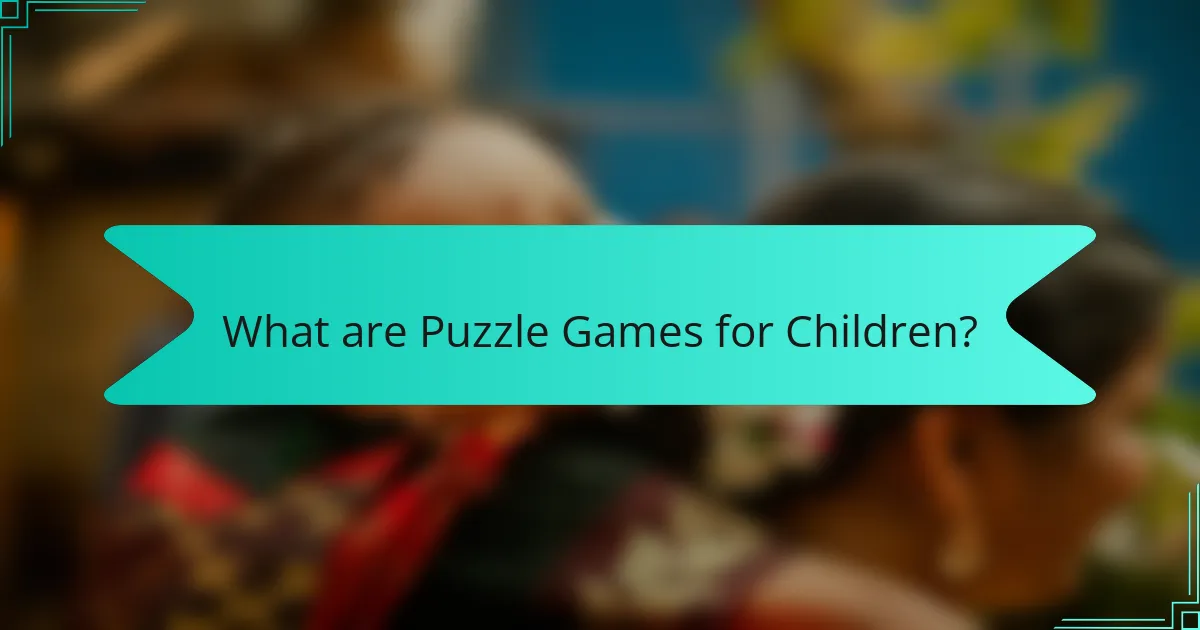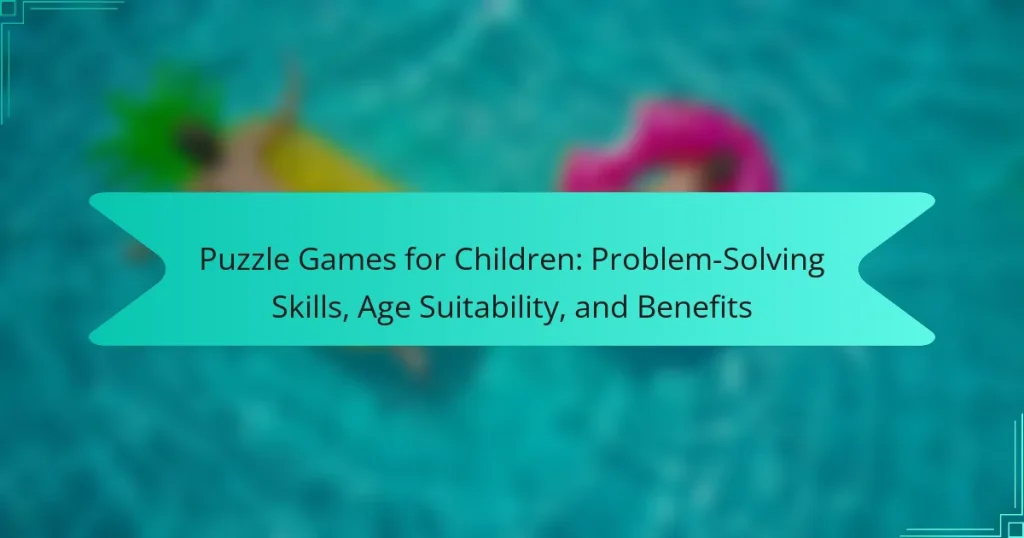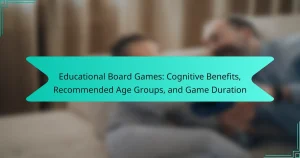Puzzle games for children are interactive activities that promote problem-solving skills and cognitive development. These games, which include jigsaw puzzles, mazes, and word puzzles, challenge young minds and enhance abilities such as logic, critical thinking, spatial awareness, and memory. Suitable for various age groups, puzzle games are designed to align with specific developmental stages, providing both entertainment and educational benefits. Research indicates that engaging in these games can significantly contribute to a child’s learning experience.

What are Puzzle Games for Children?
Puzzle games for children are interactive activities designed to challenge and engage young minds. These games often involve problem-solving tasks, such as fitting pieces together or finding hidden objects. They can enhance cognitive skills, including logic and critical thinking. Various types of puzzle games include jigsaw puzzles, mazes, and word puzzles. Research shows that children who play these games improve their spatial awareness and memory. Puzzle games are suitable for various age groups, often tailored to specific developmental stages. They provide both entertainment and educational value, making them beneficial for learning.
How do Puzzle Games enhance Problem-Solving Skills?
Puzzle games enhance problem-solving skills by challenging players to think critically and strategically. They require users to analyze situations and devise solutions. This engagement promotes cognitive flexibility and improves logical reasoning. According to a study published in the journal “Computers & Education,” puzzle games can significantly boost children’s analytical skills. The research found that children who regularly played puzzles showed a 20% improvement in problem-solving tasks compared to those who did not. Additionally, these games often present progressively complex challenges, encouraging players to adapt their strategies. This adaptability is crucial for effective problem-solving in real-life scenarios.
What specific problem-solving skills do these games develop?
Puzzle games for children develop critical thinking skills, logical reasoning, and pattern recognition. These skills are essential for analyzing problems and devising solutions. Critical thinking enables children to evaluate information and make informed decisions. Logical reasoning helps them understand cause-and-effect relationships. Pattern recognition allows kids to identify trends and make predictions based on data. Research indicates that engaging in puzzle games enhances cognitive abilities. Studies show that children who play these games improve their problem-solving skills significantly compared to those who do not.
How do different types of puzzles target various skills?
Different types of puzzles target various skills by engaging specific cognitive functions. For example, jigsaw puzzles enhance visual-spatial skills and improve attention to detail. Crossword puzzles boost vocabulary and language skills through word recognition and recall. Sudoku puzzles develop logical reasoning and critical thinking by requiring systematic problem-solving approaches. Logic puzzles enhance analytical skills and pattern recognition through deduction and inference. Each puzzle type uniquely challenges the brain, promoting diverse skill sets essential for cognitive development in children.
What is the Age Suitability for Puzzle Games?
Puzzle games are generally suitable for children aged 3 and older. Many puzzle games are designed to enhance cognitive skills and problem-solving abilities. These games often feature age-appropriate challenges that vary in complexity. For example, simple jigsaw puzzles are ideal for younger children. As children grow, they can engage with more complex puzzles that require critical thinking. Research indicates that puzzle games can improve spatial awareness and logical reasoning in children. Studies show that children who play puzzle games regularly tend to perform better in math and science subjects.
What age groups benefit most from puzzle games?
Children aged 3 to 12 benefit most from puzzle games. This age range is crucial for cognitive development. Puzzle games enhance problem-solving skills and critical thinking. Research shows that children in this group improve spatial awareness through puzzles. Additionally, children aged 5 to 7 show significant gains in logical reasoning. Studies indicate that engaging in puzzle games can lead to better academic performance. Therefore, puzzle games are particularly beneficial for young learners.
How can puzzle difficulty be adjusted for different ages?
Puzzle difficulty can be adjusted for different ages by modifying the complexity and number of pieces. Younger children benefit from puzzles with fewer, larger pieces. These puzzles often feature simple images and bright colors to engage their interest. As children grow, puzzles can include more pieces and intricate designs. For older age groups, introducing themes that require critical thinking or pattern recognition can enhance engagement. Research indicates that age-appropriate challenges improve cognitive development and problem-solving skills. Studies show that children aged 3-5 thrive on puzzles with 4-12 pieces, while 6-8-year-olds can manage 12-24 pieces effectively.
What are the Key Benefits of Puzzle Games for Children?
Puzzle games provide several key benefits for children. They enhance problem-solving skills by encouraging critical thinking. Engaging with puzzles requires children to analyze situations and develop strategies. This process boosts cognitive development significantly. Additionally, puzzle games improve fine motor skills through manipulation of pieces. They also promote patience and perseverance as children work towards completing challenges. Social skills can be enhanced when children play puzzles collaboratively. Research indicates that children who engage in puzzle games often show improved spatial reasoning abilities. These benefits contribute to overall cognitive and emotional growth in children.
How do these games promote cognitive development?
Puzzle games promote cognitive development by enhancing problem-solving skills and critical thinking. These games require players to analyze situations, identify patterns, and devise strategies. Engaging with puzzles fosters mental flexibility and adaptability. Children learn to approach challenges systematically and persistently. Research indicates that playing puzzle games can improve spatial reasoning abilities. A study by Hsin et al. (2014) found that children who engage in such games show significant improvements in cognitive skills. Additionally, these games encourage memory retention and concentration. Overall, puzzle games serve as effective tools for cognitive growth in children.
What social skills can children learn from playing puzzles?
Children can learn various social skills from playing puzzles. These skills include teamwork, as children often collaborate to complete a puzzle together. Communication skills improve as they discuss strategies and share ideas. Playing puzzles also enhances patience, as children learn to wait for their turn and work through challenges. Additionally, they develop problem-solving skills, which are essential for social interactions. Research shows that cooperative play fosters empathy and understanding among peers. Engaging with others during puzzle play encourages conflict resolution as they navigate disagreements. Overall, puzzles provide a platform for children to practice and refine essential social skills.
How do Puzzle Games Foster Engagement and Learning?
Puzzle games foster engagement and learning by promoting critical thinking and problem-solving skills. They require players to analyze situations and develop strategies to overcome challenges. This active participation enhances cognitive skills and keeps players motivated. Research shows that children who engage in puzzle games improve their spatial reasoning and logical thinking abilities. A study published in the journal “Computers & Education” found that children who played puzzle games scored higher on problem-solving tests. Additionally, puzzle games often incorporate elements that encourage collaboration and communication among players. This social interaction further enriches the learning experience.
What Types of Puzzle Games are Best for Children?
The best types of puzzle games for children include jigsaw puzzles, logic puzzles, and word puzzles. Jigsaw puzzles enhance spatial awareness and fine motor skills. Logic puzzles encourage critical thinking and problem-solving abilities. Word puzzles, such as crosswords and word searches, improve vocabulary and language skills. Educational games that incorporate math and science concepts also benefit cognitive development. Research shows that engaging in these types of puzzles can improve children’s concentration and memory. Studies indicate that children who regularly solve puzzles perform better academically.
What are the most popular puzzle formats for kids?
The most popular puzzle formats for kids include jigsaw puzzles, crossword puzzles, and sudoku. Jigsaw puzzles consist of interlocking pieces that form a picture when assembled. They promote spatial awareness and problem-solving skills. Crossword puzzles involve filling in words based on clues provided. They enhance vocabulary and critical thinking. Sudoku puzzles require filling a grid with numbers without repeating them in rows or columns. They develop logic and reasoning abilities. Other formats include maze puzzles, word searches, and logic puzzles, each offering unique cognitive benefits.
How do physical puzzles differ from digital ones?
Physical puzzles are tangible objects that require manual manipulation to solve. They engage the senses through touch and provide a hands-on experience. In contrast, digital puzzles exist on screens and often involve interactive elements through software. Digital puzzles can incorporate animations and sound effects, enhancing engagement through multimedia. Physical puzzles promote fine motor skills and spatial awareness as children physically piece together components. Digital puzzles can offer adaptive difficulty levels, allowing for personalized challenges. Research indicates that physical puzzles can improve problem-solving skills through tactile exploration, while digital puzzles can foster cognitive flexibility through varied formats.
What Tips Can Help Parents Choose the Right Puzzle Games?
Parents should consider age appropriateness when choosing puzzle games. Selecting games designed for specific age groups ensures that children can engage meaningfully. Look for puzzles that match the child’s skill level. This promotes confidence and prevents frustration. Evaluate the educational value of the game. Puzzles that enhance problem-solving skills are beneficial. Check for durability and safety of materials. Non-toxic and sturdy materials are essential for children’s games. Finally, consider the child’s interests. Engaging themes can enhance motivation and enjoyment.
Puzzle games for children are interactive activities designed to enhance problem-solving skills and cognitive development. This article explores how various types of puzzles, including jigsaw and logic puzzles, target specific skills such as critical thinking, spatial awareness, and memory. It discusses the age suitability of these games, highlighting their benefits for children aged 3 to 12, and provides insights into adjusting puzzle difficulty for different developmental stages. Additionally, the article outlines the key advantages of puzzle games, including improved fine motor skills, social skills, and overall academic performance, making them valuable tools for learning and engagement.




